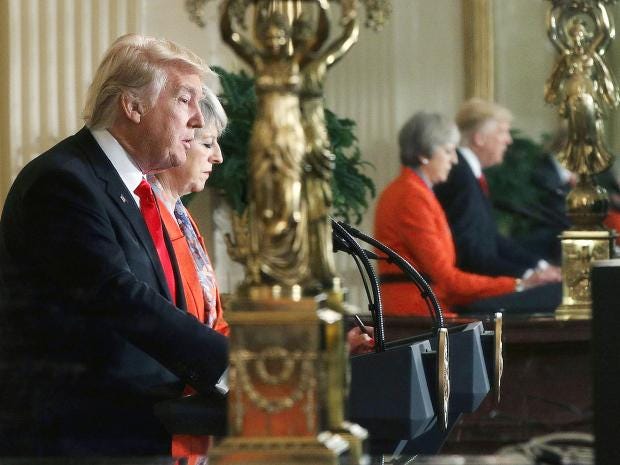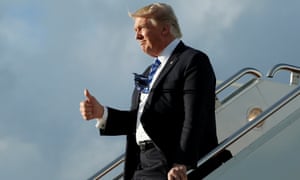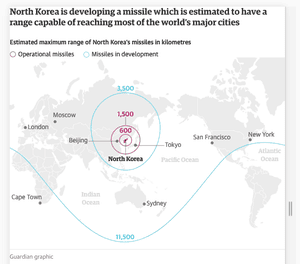War-whoops and loud applause from foreign policy establishments and their media supporters have greeted President Trump's missile strike in Syria, the dropping of the world's largest non-nuclear bomb on Afghanistan and the dispatch of a naval task force in the direction of North Korea.
This spurt in belligerence over the last week has as much to do with domestic American politics as any fundamental new development in the rest of the world. Trump needed to defuse the accusation that he was too close to President Putin and too tolerant of a Russian ally like Bashar al-Assad. The resort to military action was largely in keeping with the old Pentagon saying that "defence policy ends at the water's edge", meaning that it is politics inside, not outside the US, which is the real decision-maker.
Whatever Trump's precise motives, his sudden fondness for the use of armed force shows that what President Obama criticised as "the Washington playbook" is back in business as the guide for conduct of American foreign policy. "It's a playbook that comes out of the foreign-policy establishment," said Obama in an
interview with Jeffrey Goldberg of the Atlantic Monthly last year. "And the playbook prescribes responses to different events, and these responses tend to be militarised responses."
The poison gas attack on Khan Sheikhoun that killed 87 people and the retaliatory firing by the US of 59 missiles at a Syrian airbase was the occasion, but not the cause, of the volte face in Trump's foreign policy. Previously, he had defied the conventional wisdom of the powers that be in the US and in Britain and France on a host of issues, such as relations with Russia, Syria, China, Nato and the EU.
Cockpit video of MOAB airstrike in Afghanistan
There was something comical about the outrage expressed by self-declared experts at Trump's new departures. Anti-Trump forces interpreted any contact, however fleeting, between any Russian and any member of the Trump team, past and present, as a sign of possible treachery in a way that would have made Senator McCarthy sigh with envy.
Simple-minded though some of Trump's declarations might appear, others were more realistic than anything said by Hillary Clinton or Senator John McCain.
In Syria, for instance, the main problem for the US and its allies is and has long been that, though they would very much like to get rid of Assad, the only alternative appears to be anarchy or the empowerment of Isis and al-Qaeda clones. Clinton's policy, insofar as she had one, was to pretend that there already existed, or could be created, a "third force" in Syria that would fight and ultimately replace both Isis and Assad. This is the sort of fantasy that is frequently common currency among think tanks and dedicated experts, often retired generals or diplomats working as TV commentators.
Trump's summary of what was happening in Syria expressed during the presidential campaign was far more realistic. He said that his attitude was that "you are fighting Syria, Syria is fighting Isis, and you have to get rid of Isis. Russia is now totally aligned with Syria, and now you have Iran, which is becoming powerful because of us, aligned with Syria... Now we're backing rebels against Syria, and we have no idea who these people are."
There is nothing quite so frightened or ferocious in the world as an established order that is subjected to criticism questioning its core beliefs. Hence the embarrassing relief shown by so many world leaders, academic specialists and media commentators at the news that the direction and management of US foreign policy is returning to its old norms. Their optimism may be premature but they would clearly welcome a Trump administration neutered of any radical intentions.
Ignored in this is the fact that the militarised options favoured by "the Washington playbook" that Obama came to so despise have produced little but disaster in the post-9/11 era and are likely to do so again. Almost everything advocated by the Washington foreign policy establishment since the start of the war in Afghanistan in 2001, Iraq in 2003, Libya and Syria in 2011 and Yemen in 2015 has created or exacerbated the conflicts. Note that none of these wars have ended or show much sign of doing so.
Donald Trump says Nato 'no longer obsolete'
Obama could see what was going wrong, though he generally responded with stoic resignation rather than attempting to change the course of events. But his analysis of the weaknesses of the US foreign policy establishment and its policies is full of fascinating insights relevant to the more conventional policy on which Donald Trump is now apparently embarking. Goldberg says that Obama "questioned, often harshly, the role that America's Sunni Arab allies play in fomenting anti-American terrorism. He is clearly irritated that foreign policy orthodoxy compels him to treat Saudi Arabia as an ally." He had similar misgivings about US links to Pakistan.
TV channels and op-ed writers who treat the expertise of Washington think tanks with such fawning reverence should reflect on the Obama White House's view of these institutions. Goldberg, who spoke to Obama and his staff over a long period, reports: "A widely held sentiment inside the White House is that many of the most prominent foreign policy think tanks in Washington are doing the bidding of their Arab and pro-Israel funders. I've heard one administration official refer to Massachusetts Avenue, the home of many of these think tanks, as 'Arab-occupied territory'."
Remarkably, none of the foreign policy establishments feel that they have done anything very wrong in the Middle East since 9/11. If the governments they advise or belong to really wanted to bring to an end to the eight or more wars being waged in the great swathe of territory between Pakistan and Nigeria, they would have made more effort to do so.
The Trump foreign policy has always been a contradictory mixture of chauvinism and isolationism, of making America great again and keeping out of other people's wars. But the isolationist element in this appears to be waning, as illustrated by the US actions in Syria, Afghanistan and towards North Korea over the past week along with the more confrontational attitude towards Russia.
In pictures: US missile strike against Syria
This is in keeping with prescriptions of "the playbook", but is more dangerous than before because of the Trump administration's tendency to shoot from the hip, particularly in the direction of Iran. Relief in foreign capitals that much authority is in the hands of experienced generals may be displaced. None of these soldiers were quite as successful or farsighted in Iraq and Afghanistan as their admirers now proclaim and they have a natural tendency towards resolving problems by force.
The only real way to prevent another mass killing, such as that of the 87 people killed by chemical weapons in Khan Sheikhoun on 4 April or the 278 killed by bombs in Mosul on 17 March, is to bring these wars to an end. Measures that do not do so, but purport to deter the perpetrators or limit the suffering, are pure hypocrisy.

Reuse content












